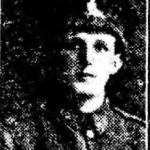BORN DRIFFIELD 1895. LIVED HULL. SON OF ELIZABETH PARKINSON, ANLABY COMMON. HE WAS A FORMER HULL & BARNSLEY LOCO WORKER, AT SPRINGHEAD, HULL AND MEMBER OF THE ANLABY FOOTBALL CLUB WHERE HE WAS WELL RESPECTED. IT WAS REPORTED THAT HE WAS SITTING IN HIS DUGOUT WHEN A STARY SHELL SPLINTER PIERCED THE ROOF KILLING HIM INSTANTLY. HE WAS THE OFFICERS ORDERLY WHO WROTE OF JOHN “THAT HE WAS ALWAYS CHEERFUL AND NEVER GRUMBLED AND EVEN IN DEATH HIS EXPRESSION SEEMED HAPPY AND CONTENT.” HIS DEATH WAS REPORTED IN THE HULL DAILY MAIL WITH HIS PHOTOGRAPH ON 26TH FEBRUARY 1916. * HIS NAME IS LISTED ON THE ANLABY WW1 MEMORIAL, ST PETER’S CHURCHYARD, WILSON STREET, ANLABY.
Gunner John Flint Parkinson was born (1895) in Cowlam Cottages, Cowlam, Driffeld, Yorkshire and served with the Royal Horse Artillery and Royal Field Artillery. His Regimental Number was 96267 and he was killed in action on the 12th February 1916. In 1911 (aged 16) he lived with his mother Elizabeth and his sister Sarah Annie at 5 Workington Ave, Anlaby Common. At this time he was a Blacksmith Striker.
When the Territorial Force was created in 1908, artillery units of the old Volunteer Force were converted into foot, horse, and garrison batteries. There were 14 batteries of
horse artillery, 12 of which belonged to the Royal Horse Artillery, the remaining two being provided by the Honourable Artillery Company. Territorial batteries were of four guns each rather than the six guns of regular batteries. The principal weapon of Territorial Royal Horse Artillery units was the Ordnance QF 15 pounder although the Ordnance BLC 15 pounder was issued to some second-line RHA units formed in 1914. At the outbreak of World War I the regular Royal Horse Artillery comprised twenty-fve batteries, eleven of those serving in India with the Indian Army. They were equipped with the Ordnance QF 13 pounder. In the 1920s, development of trucks and track vehicles brought an end to operational use of horses. By 1927, medium artillery was drawn by tractors instead of heavy draught horses. By 1937, nine field brigades had been mechanised as well as a brigade of Royal Horse Artillery.
Parkinson, John Flint
First name:
JOHN FLINT
Military Number:
96267
Rank:
Gunner
Date Died
12/02/1916
Place died:
Ypres (Menin Gate) Memorial, West-Vlaanderen, Belgium
Age:
21
5 WORKINGTON AVENUE, HULL ROAD, HULL, EAST YORKSHIRE, UK
Place Buried
